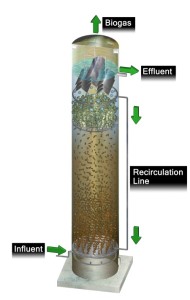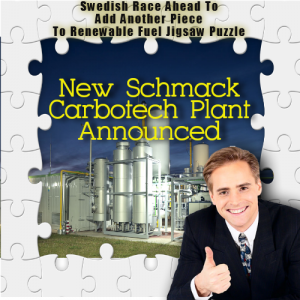Low Temperature Anaerobic Digestion - It Is The Third Type Of AD Process
I was fascinated to discover a new company with their own stand at the AD & Biogas Association (AD&B) Exhibition and Conference 2014, which was held last month at the NEC Birmingham, UK. Irish start-up NVP Energy was the company in question, and they were there to present their unique and innovative low temperature (< 20°C) Anaerobic Digestion (Lt-AD) wastewater (WW) treatment technology for medium to low-strength industrial effluents.
And, yes! You did just read “less than 20 degrees Centigrade”, so this is a truly ambient temperature process for use in our cold northern European climate, without costly insulation and heating.
If you have ever wondered why so many digesters in the UK (of the mesophilic and thermophilic variety), are a lot less productive than those un-insulated anaerobic digestion systems which seem miraculously easy to build and operate in hot climates, it has got an awful lot to do with our climate being too cold, and the cost of heating!
If you have ever wondered why so many digesters in the UK (of the mesophilic and thermophilic variety), are a lot less productive than those un-insulated anaerobic digestion systems which seem miraculously easy to build and operate in hot climates, it has got an awful lot to do with our climate being too cold, and the cost of heating!
Watch our sponsored Lt_AD explainer video below:
To view this video on the YouTube website click here and watch Low Temperature Anaerobic Digestion being explained.
So, how remarkable to find that a spin-off technology, which has taken 15 years microbiological lab and pilot scale testing at the National University of Ireland, Galway is now available for the Food and Drink Wastewater (WW) industry. Not only that there are many other industries which produce similar strength organic effluents such as the Municipal WW industry, Pharmaceutical WW industry, and also the ethanol processing WW industry. All thse can now use this technology to treat their wastewater without the ever-rising energy (running) cost implications of current aerobic treatment systems.
But like all other anaerobic digestion based processes LT-AD has, is also by nature biogas plant, with all the implications that brings for net energy export (and revenue), reduced carbon footprint for the business, and even possible sales for other products such as CO2, and the digestate as a fertilizer.
Traditionally all these industries have used aerobic wastewater treatment systems, the Lt-AD technology does what those high energy consuming systems can do. It recovers the carbon in the WW and transforms it into biogas. This means that the NVP Energy technology is a carbon neutral and energy-positive process technology which is great news for the global environment. But, lets not forget the benefits to the bottom line for those that use this new process, due to those reduced carbon costs.
If you have been watching how quickly anaerobic digestion taking hold as the preferred treatment method of choice, then just take a look at this blog! Due to its clean green energy credentials Ad is leaping ahead, and this development should be very attractive to the Food and Drinks industry, plus all other businesses producing similar effluents.
The NVP Energy process has been given the name of “Lt-AD technology” and they say that it can work equally well as a retrofit, an add-on technology to their client’s business expansion, or of course can be the core technology treatment method in any new build scenario.
For example, if you operate a Food & Drink plant that has an existing inefficient WWT system such as the activated sludge system, then their technology can:
- Lessen the load on your current system and greatly reduce your aeration costs due to our high COD attenuation
- Significantly decrease your sludge volumes. Their technology has been shown to generate up to 90% less organic sludge compared to the activated sludge process.
On the other hand, if you operate a Food & Drink plant that elutes all your wastewater to sewer, then their technology can:
- Significantly reduce your trade effluent charge/Mogden charge due to high COD & TSS attenuation.
In both cases the biogas that is produced is 100% available for reuse on-site to generate heat and/or electricity thus reducing your operational expenditure.
They say that the system will prove very attractive to Food and Drink plant operators that currently discharge their wastewater to sewer.
Where this is the current disposal method they say that NVP Energy can significantly reduce the high trade effluent discharge costs that arise from the application of the “Mogden” calculation of TE Charges due to high chemical oxygen demand (COD), and total suspended solids (TSS) attenuation.
Where this is the current disposal method they say that NVP Energy can significantly reduce the high trade effluent discharge costs that arise from the application of the “Mogden” calculation of TE Charges due to high chemical oxygen demand (COD), and total suspended solids (TSS) attenuation.
I spoke to Tracey Giles (NVP Energy, Design Engineer) who said:
“For Food and Drink plants that treat their wastewater on-site, NVP Energy can considerably decrease their aeration costs. In addition, the Lt-AD technology can reduce organic sludge volumes by up to 90% when compared to the activated sludge process thus reducing sludge management costs.”“The technology is very attractive as it has produced effluent which adheres to effluent release standards, e.g. Urban Wastewater Directive (UWWD) COD release standards, without the need for post-treatment. This is proven from our pilot-scale trials using our “low-strength” effluent definition, a type of effluent that will apply to very many businesses”.Benefits of Lt-AD are listed as:
- Significantly reduced OPEX due to lower discharge costs through a high COD attenuation (approx. 80% removal rate) capability & reduced TSS levels (approx. 50% removal rate).
- Reduced OPEX - up to 90% less organic sludge produced than the activated sludge system.
- Energy Efficient - No WW heating or aeration required. Lt-AD has been successfully trialled at temperatures as low as 40C.
- Potential savings from biogas production – can be used to generate electricity/heat that will offset use of fossil fuels.
- Potential revenue from biogas production - FITs/RHIs for on-site energy generation.
- Modular design allows flexibility in WW volumes.
- Integrates easily with existing WW treatment systems.
- Aids in adhering to specific discharge requirements e.g. UWWD.
Summary:
NVP Energy offers an exciting new and innovative energy-positive, low temperature anaerobic digestion technology (Lt-AD).
Lt-AD treats wastewater (WW) highly efficiently at temperatures as low as 4°C and will significantly reduce low strength wastewater treatment costs and TE charges. The Lt-AD technology target markets are Food and Drink WW including Dairy, Brewing, Malting and Distilling applications; Municipal WW; certain pharmaceutical WW streams and also ethanol processing WW.
For more information visit: www.nvpenergy.comhttp://nvpenergy.com




